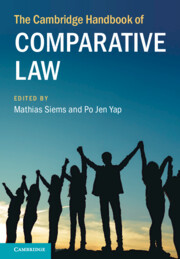Book contents
- The Cambridge Handbook of Comparative Law
- The Cambridge Handbook of Comparative Law
- Copyright page
- Contents
- Figures
- Tables
- Contributors
- Preface
- Abbreviations
- 1 Introduction
- Part I Methods of Comparative Law
- Part II Legal Families and Geographical Comparisons
- Part III Central Themes in Comparative Law
- Part IV Comparative Law beyond the State
- 28 Comparative International Law
- 29 Transnational Regulation
- 30 Quantitative Forms of Legal Governance
- 31 Comparative International Arbitration Law
- 32 Cross-Border Judicial Dialogue
- 33 Comparing Regional Law
- 34 Comparative Conflict of Laws
- 35 Comparative Indigenous Law
- 36 Comparative Legal Education
- Index
30 - Quantitative Forms of Legal Governance
from Part IV - Comparative Law beyond the State
Published online by Cambridge University Press: 26 January 2024
- The Cambridge Handbook of Comparative Law
- The Cambridge Handbook of Comparative Law
- Copyright page
- Contents
- Figures
- Tables
- Contributors
- Preface
- Abbreviations
- 1 Introduction
- Part I Methods of Comparative Law
- Part II Legal Families and Geographical Comparisons
- Part III Central Themes in Comparative Law
- Part IV Comparative Law beyond the State
- 28 Comparative International Law
- 29 Transnational Regulation
- 30 Quantitative Forms of Legal Governance
- 31 Comparative International Arbitration Law
- 32 Cross-Border Judicial Dialogue
- 33 Comparing Regional Law
- 34 Comparative Conflict of Laws
- 35 Comparative Indigenous Law
- 36 Comparative Legal Education
- Index
Summary
Quantitative research has grown to be part of the standard methodological portfolio for comparative lawyers. Large-sample quantitative studies search for correlations between legal institutions and socioeconomic outcomes, while indicators have become important tools of governance. Such initiatives, however, have been criticised for unduly simplifying complex legal realities, possibly betraying an ideological bias, and then hiding it under a cloak of quantitative data. This chapter argues that much of this critique misses the point. While it is important to be sceptical of indicators’ ability to describe reality, quantitative methodologies are part of a wider turn towards a flexible form of global governance, in which the accurate description of reality is not essential. Instead, they reflect a version of reality created for a specific purpose, which participants acting in a given regulatory space agree is not ‘real’. This lack of reality, though, is irrelevant: what matters is that the specific version of reality created by the indicator serves its institutional purpose. We must recognise it as a particular form of quantitative knowledge that, regardless of its accuracy, is constantly used instrumentally, and may open new spaces for politics, contestation, and resistance that are overlooked by the more traditional, accuracy-focused critique.
- Type
- Chapter
- Information
- The Cambridge Handbook of Comparative Law , pp. 594 - 609Publisher: Cambridge University PressPrint publication year: 2024

